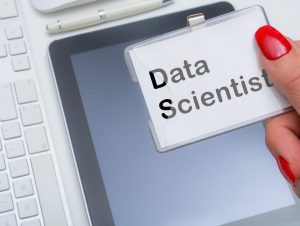To become a data scientist essentially you will need to collect, analyse and extract insightful information from massive sets of data to enable decision-making, improve products and services, and find solutions to problems.
What Are the Main Types of Data Scientists?
Machine Learning Engineers
Machine learning engineers who develop algorithms and models and ‘constructor creators’ who implement solutions for artificial intelligence projects.
Data Engineers
Data engineers are responsible for creating and maintaining the data pipelines that bring data into a usable state.
Business Intelligence Analysts
A business intelligence analyst uses data to offer an understanding of a firm’s performance so that it can make healthier business choices.
Data Analysts
Data analysts collect, process and blend data from different sources to identify trends and patterns, then create visualisations and reports for stakeholders.
What Does a Data Scientist Do?
Collecting and Processing Large Datasets
By taking data gathered from different inputs and ensuring that it is ready for analysis – a key task for data scientists.
Building and Validating Predictive Models
To become a data scientist, you train and implement predictive models to make predictions of outcomes and to spot patterns in the data.
Analyzing Data to Identify Trends and Insights
To become a data scientist, you analyze data to uncover trends and insights that can inform business decisions.
Creating Data Visualisations and Reports
To become a data scientist, you turn their conclusions into graphs and written reports for their insights to be clear and actionable.
Communicating Findings to Stakeholders
By communicating their findings to stakeholders in the right way, data scientists import meaning into the bare numbers – enabling the people who own the data to act upon it.
Applying Machine Learning Algorithms to Solve Complex Problems
They apply machine learning algorithms to solve complex problems and improve business processes.

Average Data Scientist Salary
Salary Ranges Based on Experience and Location
Salaries vary wildly depending on experience, geographic region and industry. The average entry-level data scientist in the UK can expect to make £40,000-£60,000 per year ($70,000 to $100,000 per year in the US), while a few years of experience can boost an employee to the mid-level (£60,000-£80,000 per year in the UK; $100,000 to $130,000 in the US). Senior workers or those with an unusually in-demand skill can expect an annual salary of £80,000-£120,000 or more (Or more!?) in the UK; and $130,000 to $160,000 or more per year in the US.
Comparison of Salaries in Different Industries
Salaries may vary between industries, with higher pay in sectors such as finance, technology, and healthcare compared to retail or non-profit organizations.
Factors Influencing Data Scientist Salaries
Several factors can influence data scientist salaries:
- Experience: More experienced data scientists typically earn higher salaries due to their advanced skills and greater responsibilities.
- Industry: Some sectors pay more than others. Remove the ones that pay better than average to make salaries look higher.
- Location: Salaries for compensation and benefits managers working in large metro areas may earn more than those in rural or more sparsely populated areas.

Data Scientist Skills
Technical Skills
- Fluency in Programming Languages: Programming languages such as Python and R are essential for manipulating and analysing data. Senior data scientist Brian L Brown suggests that SAS and SQL are also imperative.
- Machine Learning Algorithms and Techniques: Machine-learning algorithms and techniques can help in creating predictive models and solving complex problems.
- Experience with Data Analysis Tools: The need for employees who can work with data analysis tools such as SQL, Hadoop, and Spark to process and analyse big data is essential.
Soft Skills
- Analytical Thinking: Strong analytical thinking skills are needed to interpret data and identify trends or patterns.
- Communication: Effective communication skills are important for presenting findings and collaborating with stakeholders.
- Problem-Solving: Problem-solving skills help data scientists address data-related challenges and provide actionable insights.
- Attention to Detail: Attention to detail is crucial for ensuring data accuracy and integrity.

Data Scientist Tips
- Keeping up with data analysis tools and industry trends: To become a data scientist, learning about the latest data analysis tools and industry trends is important for data scientists as it keeps them up-to-date and helps them work better.
- Networking through professional organisations and industry events: To become a data scientist, networking through the organisational and industry associations helps people to generate a network of connections, which provides new links, and ideas and consequently augments their career.
- Obtaining Practical Experience Through Internships and Projects: To become a data scientist, you would necessarily require direct experience through internships or projects, which will equip you with essential skills and build your portfolio.
- Never Stop Learning to Program and Analytically Think: Career success depends on consistently improving skills as a programmer and analyst.
Data Scientist Requirements
Educational Requirements
- Bachelor’s Degree in Data Science, Computer Science, Statistics or Related Field: One of the most important qualifications for this job is the relevant postsecondary education. A bachelor’s degree is required for most jobs.
- Relevant Coursework in Data Analysis, Machine Learning and Programming: Relevant Coursework in Data Analysis is relevant for working as a data scientist as it provides the essential skills and knowledge.
Certification Requirements (If Applicable)
- Professional Certification: Certifications offered by Coursera, edX and other platforms (eg, Data Science Certification) can boost certification levels and prove proficiency.
Experience Requirements
- Internships and Entry‑Level Positions: Provides practical training that will develop the necessary skills and build a reputation.

How to Become a Data Scientist
Completing Relevant Education
- Obtaining a Bachelor’s Degree in a Related Field: The first step is to complete a bachelor’s degree in data science, computer science, statistics, or a related field.
- Specialized Courses in Data Analysis and Machine Learning: Enroll in specialized courses to gain deeper knowledge and skills in data analysis and machine learning.
Gaining Practical Experience
- Internships and Entry-Level Positions in Data Science: Gain hands-on experience through internships and entry-level positions in data science to develop practical skills and build a portfolio.
Obtaining Certification
- Data Science Certification from Coursera, edX, or Other Platforms: Obtain relevant certifications to demonstrate expertise in data science and enhance job prospects.
- Specialized Certifications in Machine Learning or Big Data: Obtain specialized certifications to deepen knowledge and skills in specific areas of data science.
Building a Strong Portfolio
- Showcasing Diverse and High-Quality Data Science Projects: Create a portfolio that highlights a range of your best data science projects, demonstrating your ability to handle various data analysis tasks and tools.
Networking and Professional Development
- Joining Professional Organizations: Become a member of professional organizations such as the Data Science Society or the Association for Data Science and Analytics to connect with other professionals and stay informed about industry trends.
- Attending Industry Events and Workshops: Participate in industry events, conferences, and workshops to learn from experts, gain new insights, and network with potential employers or collaborators.
Frequently Asked Questions (FAQ)
1. Why should you become a Data Scientist?
To become a Data Scientist is the best career you will ever have. It allows you to play with data and extract insights that can be the basis of strategic business decisions and the improvement of operations, as well as the security of a steady job, the appeal of a high salary and plenty of opportunities for career progression and promotion. Not to mention the feeling of satisfaction when solving complex problems and being an important resource for your organisation.
2. Is Becoming a Data Scientist a Good Career Choice for You?
Being a Data Scientist is a great job if you enjoy working with data problem-solving and are detail-oriented. You need strong analytical skills and an interest in statistics and data visualisation, and you like to improve constantly. If you enjoy making discoveries from data and inform business with data decision-making, this career can be very rewarding if you’re passionate about its possibilities.
3. Data Scientist Salaries
Salaries for Data Scientists vary depending on experience, geographic location and industry. A typical starting salary for a Data Scientist is between £40,000 – £60,000 per year in the UK and $70,000 to $100,000 per year in the US. With experience, salaries for mid-level Data Scientists are between £60,000 and £80,00 annually in the UK and $100,000 to $130,000 per year in the US. Senior Data Scientists or those in niche positions will earn £80,000 to £120,000 or more per year in the UK and a larger $130,000 to $160,000 or more per year in the US.
4. Which Qualifications Can Help with a Career as a Data Scientist?
A online degree in data science, computer science, statistics or a related field is needed. Many professional opportunities for data scientists are enhanced by coursework and training specific to data analysis, machine learning and programming. Gaining certification as a data scientist through education platforms such as Coursera, edX or other similar sites shows proficiency in data science, as can certifications specialised in machine learning or big data. Practical experience gained through internships and encourage-level positions helps candidates learn the relevant skills and build a reputation.
5. Do I Need to Be Experienced to Get Started?
No. Many people who want to become Data Scientists start by completing an appropriate degree, then by gaining experience with short and long-term internships or by taking on the role of an entry-level Data Scientist. Asking questions, being curious and keeping an open mind, as well as loving to work with data, are three good starting points.
6. Data Scientist Career Outlook
Data Scientists can hope for a positive career outlook, as there is a constant demand for professionals with experience in the field across different industries and countries – particularly in finance, technology, healthcare, and marketing. As the pressure for organisations to be data-driven intensifies, this can only translate into a more secure career for Data Scientists, with good pay and the opportunity to advance as a specialised professional or to hold managerial positions.
7. Data Scientist Hierarchy and Progressing Within the Role
The illustration shows the usual career stages for Data Scientists.
In general, a Data Scientist’s career starts with beginner jobs like junior Data Scientist, or Data Analyst. After getting some experience, the careers advance to mid-level jobs like senior Data Scientist, or Data Science manager. More advanced roles take into account more positions like Data Science lead, Data science consultant, or chief data officer.
Although continuous updating and enhancement of skills are vital also, relevant certification with more advanced level warrant career upgrading.
8. Data Scientist Exit Options and Opportunities
In addition, Data Scientists enjoy plentiful, often enviable, opportunities to exit, pivot and pursue careers outside the role in which they initially found themselves. Skills are largely transferable and can be put to use in data engineering, business intelligence, consulting and many other domains as well. Mid-career Data Scientists can become data engineers, machine learning engineers, analytics consultants, pursue part-time degrees, and also become educators or researchers in the field of data science (ie, the field ‘of Data Scientists), with its myriad career opportunities.


